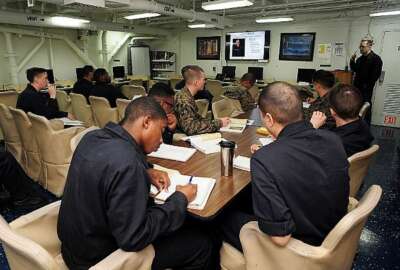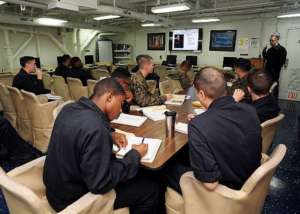

The Navy said increased demand led to a shortage of funds to award new tuition assistance until the next fiscal year.
Best listening experience is on Chrome, Firefox or Safari. Subscribe to Federal Drive’s daily audio interviews on Apple Podcasts or PodcastOne.
Due to increased use and financial constraints, the Navy will no longer issue new tuition assistance to sailors for the rest of fiscal 2019.
The Navy announced last Tuesday that it is officially out of money for tuition assistance and in order to prevent future problems with the program it will put new constraints on who can use the funds starting Oct. 1. At this point, if sailors who have been awarded assistance will be able to use it, but no new awards will be made.

Starting Oct. 1, sailors will not be able to use tuition assistance in their first two years of service. The Navy will drop the annual credit limit from $4,500 a year to $3,000 a year — which translates to about 12 credit hours a year.
“Twelve semester hours per year is a pretty good course load for the average sailor,” Jim Johnson, the voluntary education service chief for the chief of naval personnel, told Federal News Network. “We have sailors who are superstars who can take more than that. We don’t need full-time sailors and full time students. We want full-time sailors and part-time students.”
The Navy is also capping voluntary education usage to 120 semester hours, the same amount needed to get a bachelor’s degree.
The Navy’s tuition assistance funding shortage started as the service noticed a 30% increase in demand at the midpoint of 2019, compared the historical usage over the last several years.
“That was completely unexpected,” Johnson said. “We knew at that point that we had a problem with funding for the rest of the fiscal year and tried to identify ways to mitigate that, but decided instead to put controls in place for the next fiscal year to allow people sufficient time to plan.”
The move has some experts and former beneficiaries of the program worried about how the Navy’s handling of tuition assistance will affect the morale and retention of sailors. Others are concerned about how the impact might stymie industrious sailors and Marines at a time when the military is looking for men and women with advanced skills and talents as the U.S. turns its sights toward near-peer competitors like China and Russia.
“We made a change last fiscal year that really increased the interest and participation and then we have also increased sailor access to education by transforming from brick and mortar Navy college offices to a virtual education service delivery,” Johnson said. “We were putting voluntary education in sailors’ hands and so access was much easier for them and it really drove usage up in a way we didn’t anticipate.”

“As we grow the Navy over the next several years, we have a lot of funding priorities that are higher priority than tuition assistance,” Johnson said. “We have to build a 350-ship Navy that requires more sailors, more training dollars. We have to make sure we are building the Navy the nation needs using the money we have.”
That means that sailors will have to make due with less to “ensure the solvency of the program for the most sailors possible for the long term of the program” Johnson said.
As the Navy constricts the use of tuition assistance, it’s also trying to keep those superstars in the Navy and to pick them out of the masses to promote them faster.
The military as a whole is turning its sights toward near-peer adversaries like China and Russia, which means it needs smart, educated and critical thinking service members.
“I am convinced, now more than ever before, that the intellectual development of our naval leaders is the most critical warfighting capability for our national security,” Navy Secretary Richard Spencer wrote in a Feb. 5 memo establishing a Naval University System that integrates and aligns naval education and establishes a community college for enlisted sailors and Marines.
“One of the things I said at my testimony before the Commission on Military, National, and Public Service is that as technology advances and as conflict often stays below the threshold of major kinetic engagement, the U.S. military will need people who are flexible, creative, adaptable thinkers,” Lindsay Cohn, a political scientist who works on military manpower issues told Federal News Network. Cohn teaches at the U.S. Naval War College, but spoke with Federal News Network in personal capacity. “This is likely to be true all the way down the ranks. Further training and education of any kind is likely, in general, to improve the skills and aptitude of the individual, and that is, in general, good for the Navy, both in terms of maintaining morale and in terms of the actual skills they can draw upon.”
That’s something the Navy and other services want from their service members. The services are creating talent marketplaces similar to LinkedIn to give service members a way to show off skills that are outside of their military specialty. Top military officers consistently bring up anecdotes about finding a grunt in the field who is a master coder, but the military had no idea because the personnel system is antiquated and doesn’t take into account skills outside of a service member’s occupation. Cohn said restricting assistance may keep sailors from cultivating those hobbies.
The other area of concern is around retention and recruitment. The Navy is growing, but as René Campos, senior director for veterans and wounded warriors at the Military Officers Association of America told Federal News Network, the lack of tuition assistance paired with good economy could cause issues for sailor motivation, especially since tuition assistance is so popular.
Matthew Moores, a retired Marine sergeant, said he was disappointed to see the way the Navy was handling the problem.
“I took classes because I wanted to be a better Marine,” he said. “Classes and studying take up time that Marines would have used in the barracks playing Call of Duty or drinking.”
Moores said a lot of troops want to take advantage of tuition assistance so their GI Bill benefits won’t run out and they can get a head start on life.
Copyright © 2025 Federal News Network. All rights reserved. This website is not intended for users located within the European Economic Area.
Scott Maucione is a defense reporter for Federal News Network and reports on human capital, workforce and the Defense Department at-large.
Follow @smaucioneWFED
